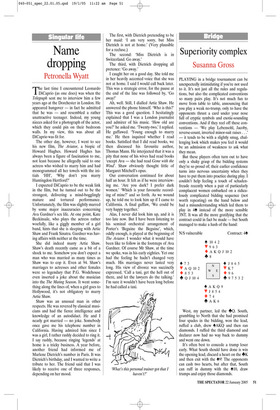Name dropping
Petronella Wyatt
The last time I encountered Leonardo DiCaprio (as one does) was when the Telegraph sent me to interview him a few years ago at the Dorchester in London. He appeared hungover — in fact he admitted that he was — and resembled a rather unattractive teenager. Indeed, my young nieces asked for a photograph of the actor, which they could pin on their bedroom walls. In my view, this was about all DiCaprio was fit for.
The other day, however, I went to see his new film, The Aviator, a biopic of Howard Hughes. Howard Hughes has always been a figure of fascination to me, not least because he allegedly said to one actress who wished to marry him and had monogrammed all her towels with the initials ‘HH’, ‘Why don’t you marry Huntingdon Hertford?’ I expected DiCaprio to be the weak link in the film, but he turned out to be the strongest, delivering a mind-bogglingly mature and tortured performance. Unfortunately, the film was slightly marred by some major inaccuracies concerning Ava Gardner’s sex life. At one point, Kate Beckinsale, who plays the actress rather woefully, like a giggly member of a girl band, hints that she is sleeping with Artie Shaw and Frank Sinatra. Gardner was having affairs with neither at the time.
She did indeed marry Artie Shaw. Shaw’s death recently came as a bit of a shock to me. Somehow you don’t expect a man who was married as many times as Shaw was to cop it. Even at 94. Shaw’s marriages to actresses and other females were so legendary that P.G. Wodehouse even inserted a joke about the musician into the The Mating Season. It went something along the lines of, when a girl goes to Hollywood, it’s not obligatory to marry Artie Shaw.
Shaw was an unusual man in other respects. He was revered by classical musicians and had the fierce intelligence and knowledge of an autodidact. He and I nearly got married — no joke. Somebody once gave me his telephone number in California. Having admired him since I was a girl, I rather rashly decided to ring it. I say rashly, because ringing ‘legends’ at home is a tricky business. A year before, another friend had informed me of Marlene Dietrich’s number in Paris. It was Dietrich’s birthday, and I wanted to write a tribute to her. The friend said that I was likely to receive one of three responses, depending on her mood. The first, with Dietrich pretending to be her maid: ‘I am very sorry, but Miss Dietrich is not at home.’ (Very plausible for a recluse.) The second: ‘Miss Dietrich is in Switzerland. Go away.’ The third, with Dietrich dropping all pretence: ‘Go away.’ I caught her on a good day. She told me in her heavily accented voice that she was not at home. I said I would call back later. This was a strategic error, for the pause at the end of the line was followed by, ‘Go away!’ Ah, well. Still, I dialled Artie Shaw. He answered the phone himself. ‘Who is this?’ This was a good question. I hesitatingly explained that I was a London journalist and admirer of his music. ‘How old are you?’ he asked me. ‘Twenty-two,’ I replied. He guffawed. ‘Young enough to marry me.’ He then inquired whether I read books. Satisfied that I did read books, we then discussed his favourite author, Thomas Mann. He interjected that it was a pity that none of his wives had read books ‘except Ava — she had read Gone with the Wind’. Shaw obviously thought little of Margaret Mitchell’s opus.
Our conversation continued for about half an hour. It felt as if he were interviewing me. ‘Are you dark? I prefer dark women.’ ‘Which is your favourite recording of mine?’ and so forth. As we wound up, he told me to look him up if I came to California. A final guffaw, ‘We could be very happy together.’ Alas, I never did look him up, and it is too late now. But I have been listening to his seminal orchestral arrangement of Porter’s ‘Beguine the Beguine’, which, oddly enough, is played at the beginning of The Aviator. I wonder what it would have been like to follow in the footsteps of Ava Gardner. Of course Mr Shaw, at the time we spoke, was in his early eighties. Yet one had the feeling he hadn’t changed very much. His marriages never lasted very long. His view of divorce was succinctly expressed, ‘Call a taxi, get the hell out of there, and let the lawyers do the talking.’ I’m sure it wouldn’t have been long before he had called a taxi.













































 Previous page
Previous page